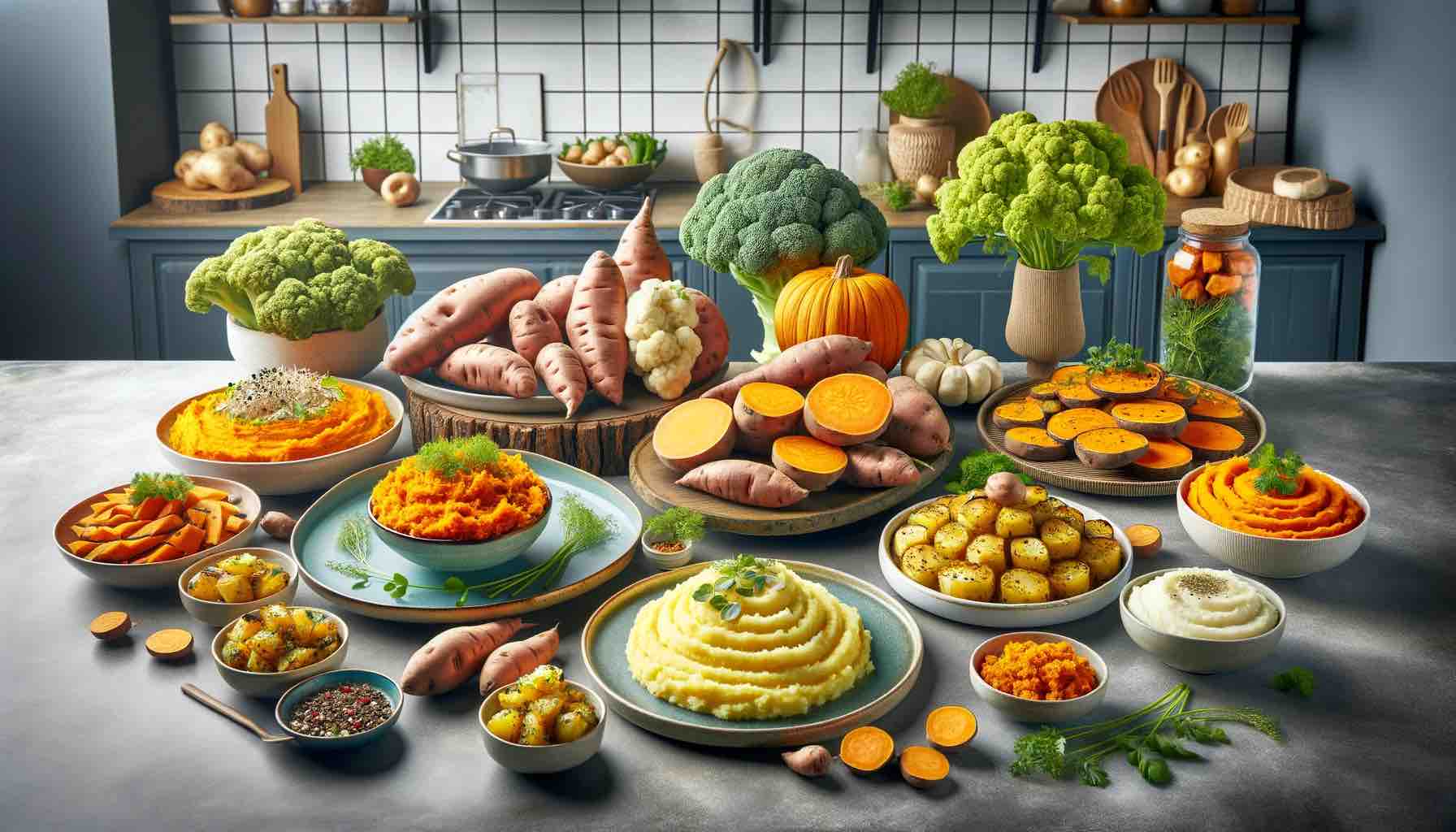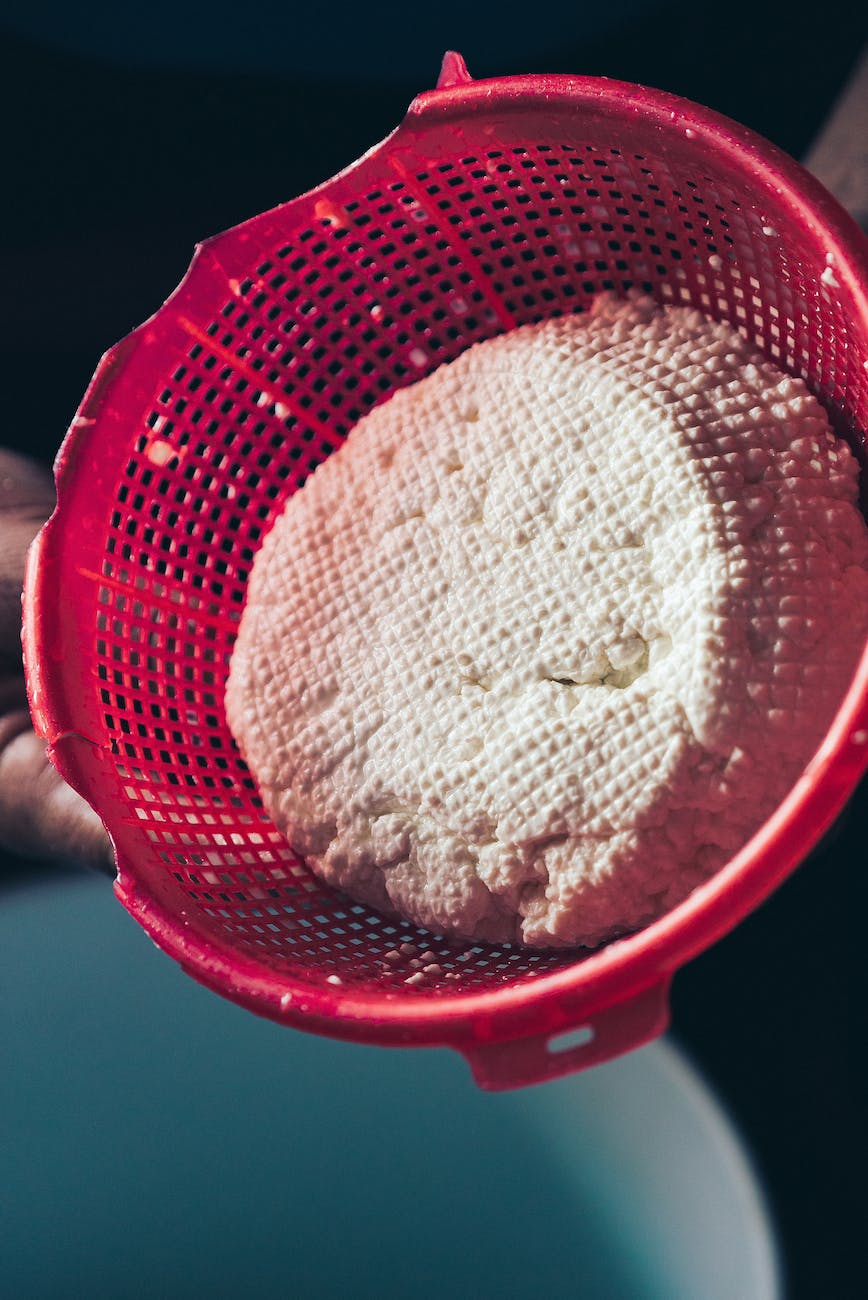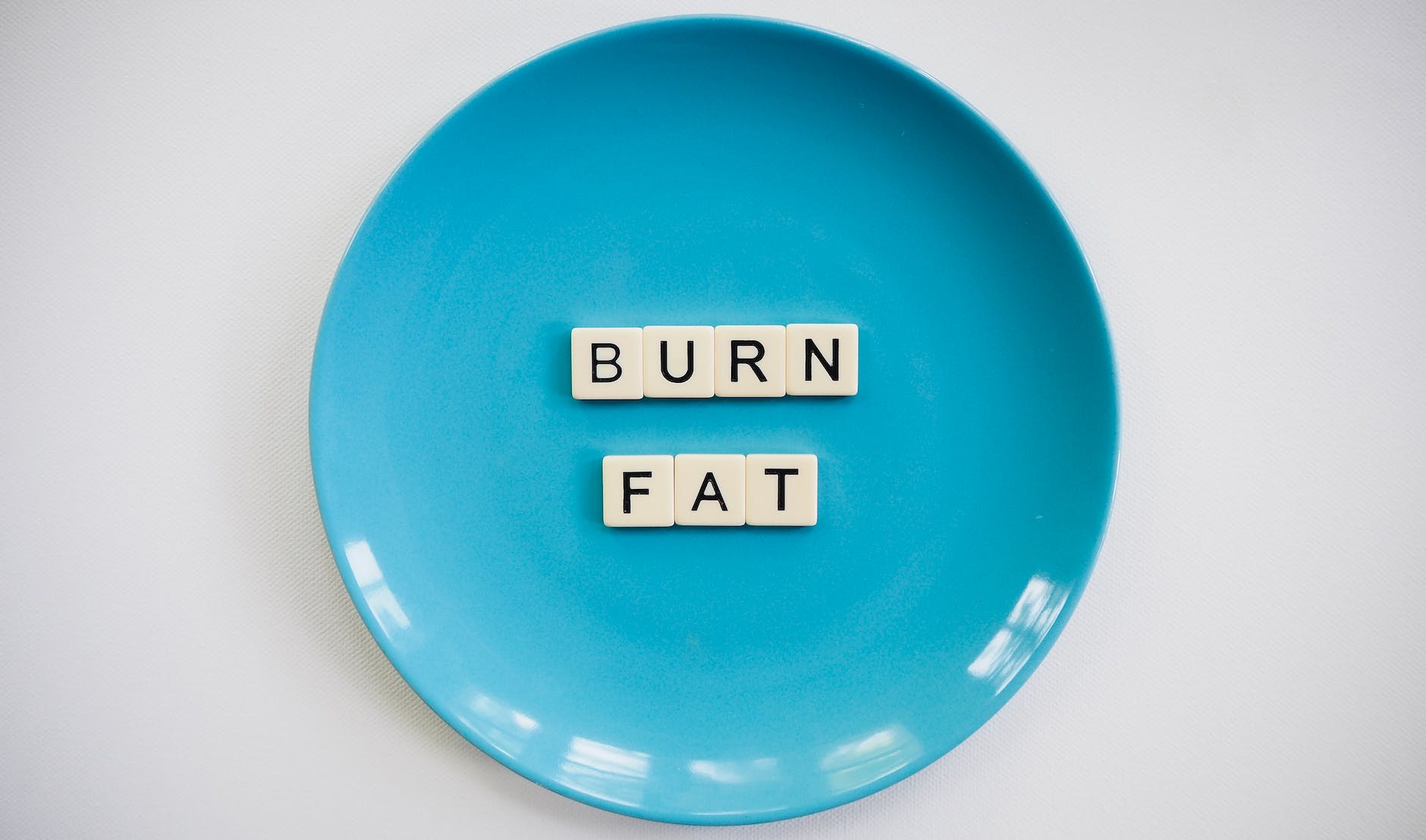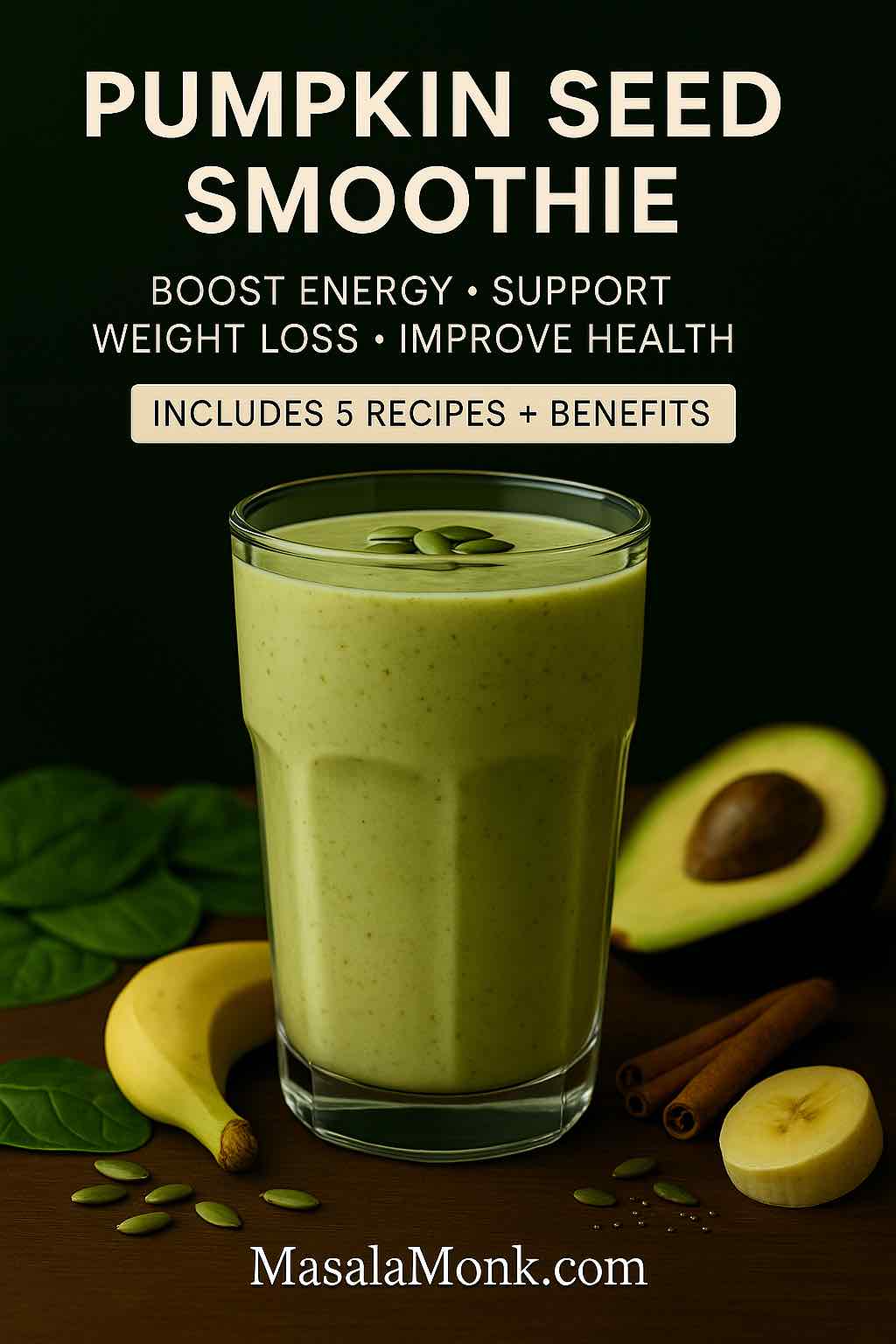
There’s something comforting about starting your day with a smoothie. It’s quick, nourishing, and gives you that little “reset” button we often crave in the morning. Now, imagine making that smoothie even more powerful by adding a simple ingredient you probably already have in your kitchen — pumpkin seeds. A pumpkin seed smoothie isn’t just creamy and delicious, it’s also a smart way to sneak in nutrients that support energy, satiety, and even weight loss. Think of it as a small daily ritual that helps keep your cravings in check, your digestion on track, and your body fueled with lasting energy.
Read More: The Benefits of Pumpkin Seeds for Weight Loss and Blood Sugar Control
But don’t just take our word for it — science has a lot to say about these tiny green seeds.
🔬 The Science Behind Pumpkin Seed Smoothies
Pumpkin seeds may be small, but research shows they’re packed with benefits that make them the perfect smoothie booster:
- Keeps you fuller for longer. Pumpkin seeds are rich in protein, fiber, and healthy fats — the trifecta for curbing cravings and avoiding those mid-morning snack crashes. Studies consistently show that diets high in fiber support long-term weight management by keeping you satisfied without excess calories (Healthline).
- Balances blood sugar and supports heart health. Thanks to their high magnesium content, pumpkin seeds may help regulate blood sugar and lower blood pressure. In fact, a clinical trial found that adding pumpkin seeds to meals reduced post-meal blood sugar spikes, making them especially useful when blended into a breakfast smoothie (Journal of Nutrition & Food Science, PDF).
- Packed with micronutrients that support mood and metabolism. Pumpkin seeds deliver magnesium, zinc, antioxidants, and even tryptophan — an amino acid linked to better sleep and mood. That’s why experts often call them a super-seed for whole-body health (Cleveland Clinic, NY Post).
- Simple but mighty. Even eating just a spoonful of pumpkin seeds daily can improve digestion, immunity, and skin health — according to recent insights on everyday consumption habits (Times of India).
Also Read: Benefits of Nuts and Seeds – Protein-Packed Superfoods
✨ Why This Matters for Your Smoothie
When you blend pumpkin seeds into your smoothie, you’re not just creating a tasty drink — you’re giving your body a nutrient-dense upgrade. The protein and fiber help with weight control, the magnesium supports energy and calm, and the antioxidants keep your health in balance.
So, whether you’re reaching for a smoothie to kickstart your morning, refuel after a workout, or simply curb cravings in a healthy way, the humble pumpkin seed smoothie is a practical, research-backed choice that’s easy to stick with.
5 Easy Pumpkin Seed Smoothie Recipes
Whether you’re new to smoothies or already blending them daily, it’s easy to feel lost in the sea of recipes online. That’s why instead of giving you five random ideas, we’ve carefully selected these recipes to match both what’s trending and what actually helps you in your health journey.
Each smoothie below is designed with a unique purpose — whether it’s detoxing, fueling your workouts, managing sugar, or simply keeping things quick and simple. Here’s why these five recipes made the cut:
- Green Pumpkin Seed Detox Smoothie → Perfect for mornings when you want something light, fresh, and digestion-friendly. A trending category thanks to “detox” and “green smoothies” being perennial favorites.
- Pumpkin Spice Protein Smoothie → Because pumpkin spice never goes out of style. This one combines comfort with protein power, making healthy eating feel indulgent.
- Low-Carb Pumpkin Seed Shake → Tailored for keto and low-carb seekers who often skip smoothies due to high fruit sugar. Creamy, filling, and blood-sugar-friendly.
- Post-Workout Recovery Smoothie → Designed for fitness lovers. High in protein, potassium, and magnesium to refuel muscles and aid recovery.
- Minimalist 3-Ingredient Pumpkin Seed Smoothie → Sometimes less is more. This one proves you can make a nourishing smoothie in under 2 minutes with just three simple ingredients.
Together, these recipes cover different lifestyles and goals: weight loss, fitness, energy, comfort, and convenience. Think of this as your “smoothie toolkit” — pick the one that fits your mood or goal each day.
Green Pumpkin Seed Detox Smoothie
If your mornings feel heavy or sluggish, this smoothie is like a reset button in a glass. Fresh cucumber, spinach, and banana meet protein-rich pumpkin seeds for a blend that supports digestion, boosts hydration, and keeps your energy steady without weighing you down.
Ingredients:
- 2 tbsp pumpkin seeds (soaked overnight for smoother texture & better digestion)
- 1 cup spinach or kale (fresh or frozen)
- ½ cucumber, chopped
- 1 small frozen banana (adds creaminess + sweetness)
- 1 cup unsweetened almond milk (or other plant milk)
- 1 tsp honey or maple syrup (optional)
- Ice cubes as needed
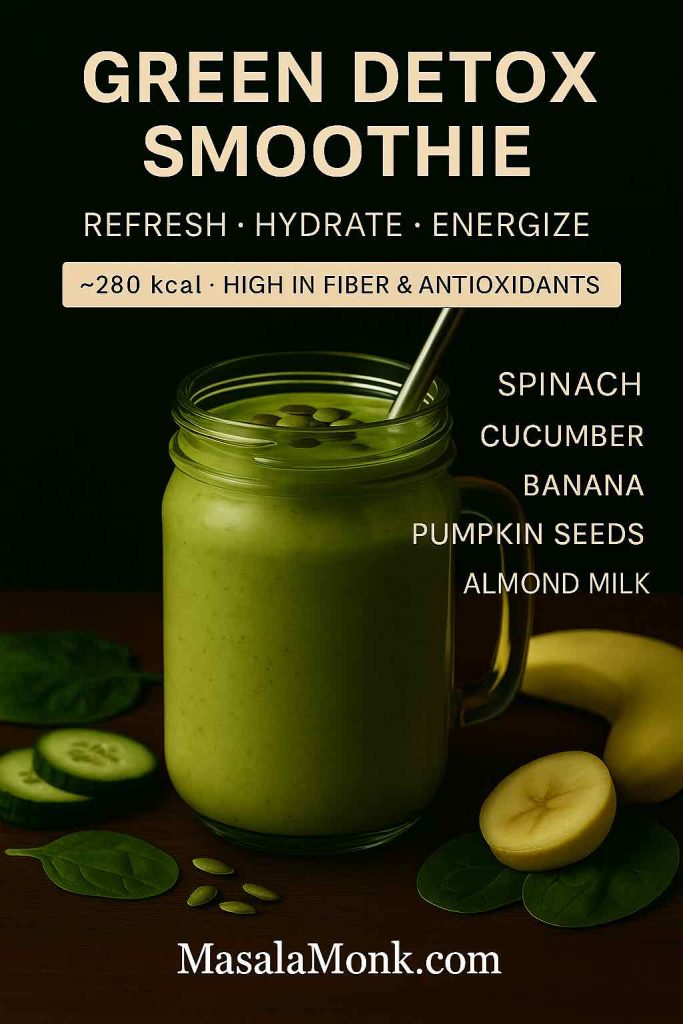
Instructions:
- Blend soaked pumpkin seeds with almond milk until silky.
- Add spinach, cucumber, and banana. Blend until bright green and smooth.
- Taste and add honey or maple syrup if you prefer it sweeter.
- Adjust thickness with ice cubes or a splash of extra milk.
- Pour into a tall glass, top with extra pumpkin seeds, and enjoy fresh.
Nutrition (approx.):
220 kcal | 8g protein | 6g fiber | Rich in magnesium & antioxidants
Pro Tips:
- Swap spinach for kale if you want a stronger, earthier flavor.
- Add 1 tbsp fresh lemon juice for extra detox and brightness.
- Replace banana with frozen mango if you want less sugar and a tangier taste.
👉 For more refreshing blends that cleanse and energize, check out these Turmeric and Moringa Detox Smoothies.
Pumpkin Spice Protein Smoothie
Who says pumpkin spice is only for fall? This smoothie delivers cozy café vibes year-round — with cinnamon, nutmeg, and pumpkin purée — but unlike a latte, it actually keeps you full. With protein powder or Greek yogurt, it’s perfect for weight management while still tasting indulgent.
Ingredients:
- 2 tbsp pumpkin seeds
- ½ cup pumpkin purée (unsweetened)
- 1 frozen banana
- 1 scoop vanilla protein powder (or ½ cup Greek yogurt)
- 1 cup oat milk (or milk of choice)
- ½ tsp cinnamon
- Pinch of nutmeg & ginger
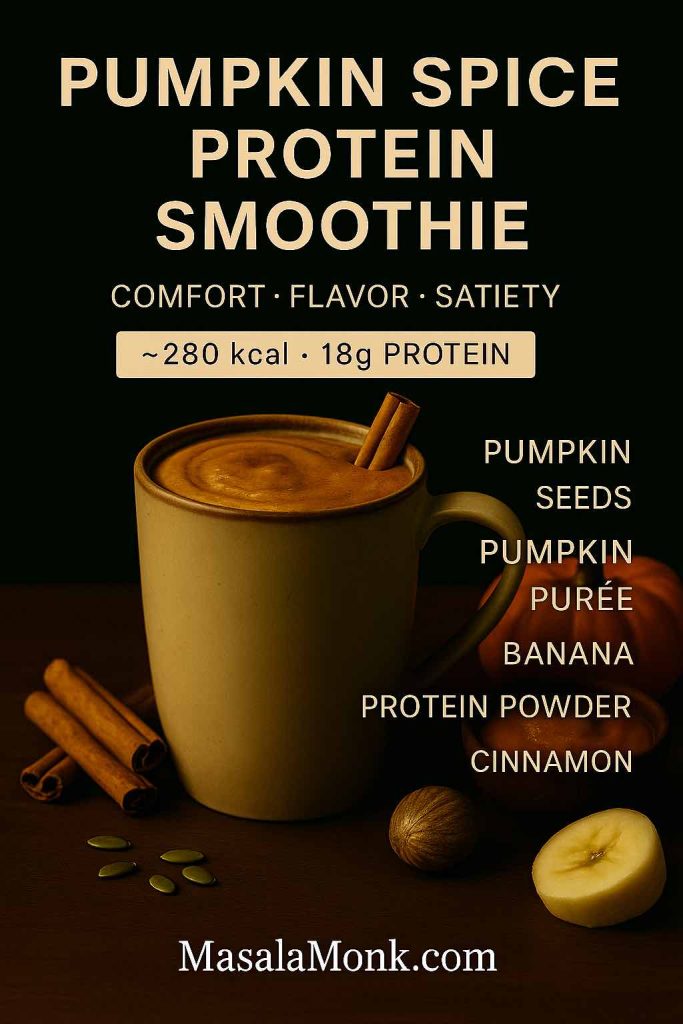
Instructions:
- Add all ingredients to your blender.
- Blend until thick, creamy, and well combined.
- Pour into a mug, sprinkle cinnamon on top, and enjoy your “healthy pumpkin spice latte in a glass.”
Nutrition (approx.):
280 kcal | 18g protein | 7g fiber | Antioxidant-rich
Pro Tips:
- No pumpkin purée? Use steamed sweet potato for a similar taste.
- Want more protein? Double the seeds or use Greek yogurt and powder.
- For a dessert-like touch, add ½ tsp vanilla extract.
👉 If cozy, protein-rich flavors are your thing, you’ll also love these Almond & Chia Protein Smoothies, which strike the same balance of indulgence and nourishment.
Low-Carb Pumpkin Seed Shake
If you love smoothies but hate the sugar spike, this shake is your best friend. It’s creamy, filling, and designed with low-carb eaters in mind. Avocado brings healthy fats, chia seeds add fiber, and pumpkin seeds tie it all together with protein.
Ingredients:
- 3 tbsp pumpkin seeds
- ½ ripe avocado
- 1 cup unsweetened almond milk
- 1 handful spinach (optional, extra greens)
- 1 tbsp chia seeds
- Stevia or monk fruit (optional, to taste)
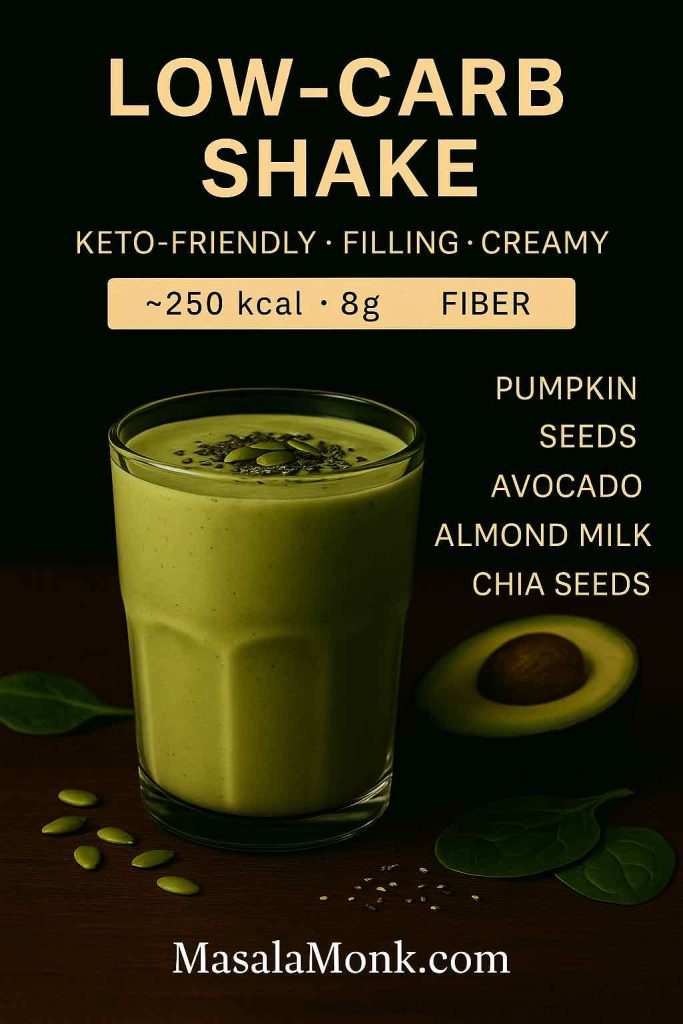
Instructions:
- Blend pumpkin seeds with almond milk until smooth.
- Add avocado, spinach, chia, and sweetener.
- Blend until thick and creamy.
- Adjust sweetness or texture as needed.
Nutrition (approx.):
250 kcal | 10g protein | 8g fiber | Low carb, high healthy fats
Pro Tips:
- Want it thicker? Add 2–3 ice cubes or use frozen avocado chunks.
- For a boost, add unsweetened cocoa powder — think “keto chocolate shake.”
- If you’re not strict keto, a few frozen berries add antioxidants without much sugar.
👉 Looking for more low-carb inspiration? These Macadamia & Flax Keto Smoothies deliver fiber, protein, and creaminess without the sugar crash.
Post-Workout Recovery Smoothie with Pumpkin Seeds
After exercise, your muscles need a mix of protein, carbs, and minerals to recover. This smoothie checks every box: banana restores glycogen, pumpkin seeds deliver protein and magnesium, and cocoa adds antioxidants. It tastes like a chocolate milkshake but works like a recovery drink.
Ingredients:
- 2 tbsp pumpkin seeds
- 1 frozen banana
- 1 scoop whey or plant-based protein powder
- 1 cup soy milk (or high-protein milk alternative)
- 1 tsp unsweetened cocoa powder
- Ice cubes as needed
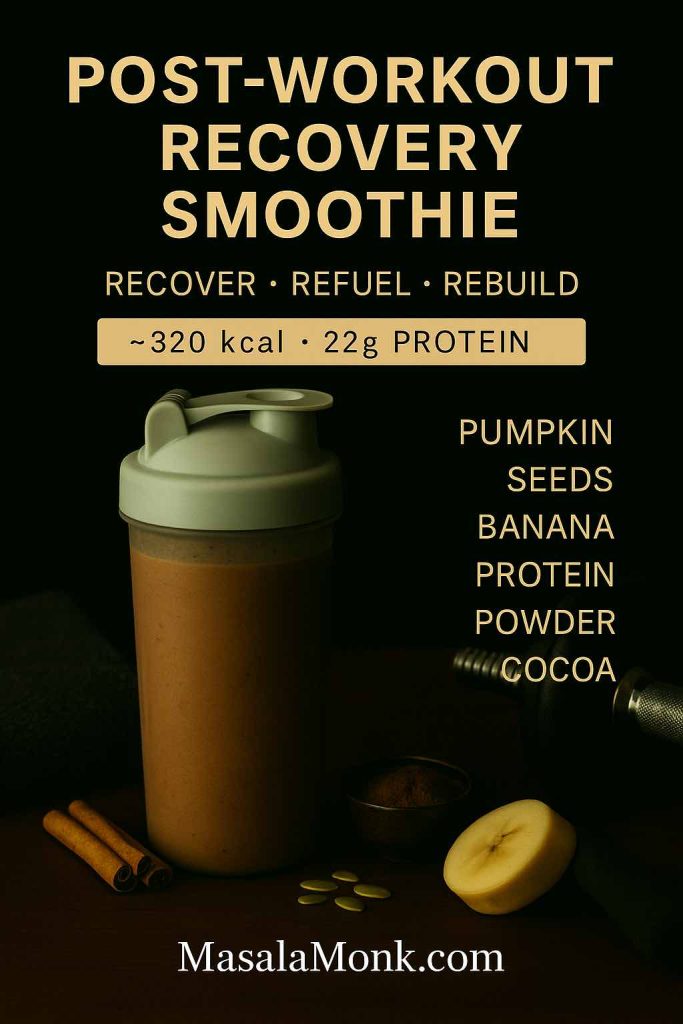
Instructions:
- Combine all ingredients in a blender.
- Blend until creamy and lump-free.
- Pour into a tall glass, sprinkle cocoa on top, and refuel.
Nutrition (approx.):
320 kcal | 22g protein | 8g fiber | Excellent for muscle repair
Pro Tips:
- Swap banana for frozen pineapple if you prefer a tropical post-workout vibe.
- Use chocolate protein powder instead of vanilla for double cocoa goodness.
- Add a pinch of sea salt to replenish electrolytes naturally.
👉 For more recovery-friendly snack options with a protein edge, explore these Healthy Oat Protein Bars – 5 Easy No Sugar Recipes for Snacks.
Minimalist 3-Ingredient Smoothie with Pumpkin Seeds
Sometimes, less is more. This smoothie is proof that you don’t need a long ingredient list for something tasty and nourishing. With just three ingredients, it’s quick enough for busy mornings or a mid-day snack that doesn’t derail your goals.
Ingredients:
- 3 tbsp pumpkin seeds
- 1 cup almond milk
- 1 frozen banana
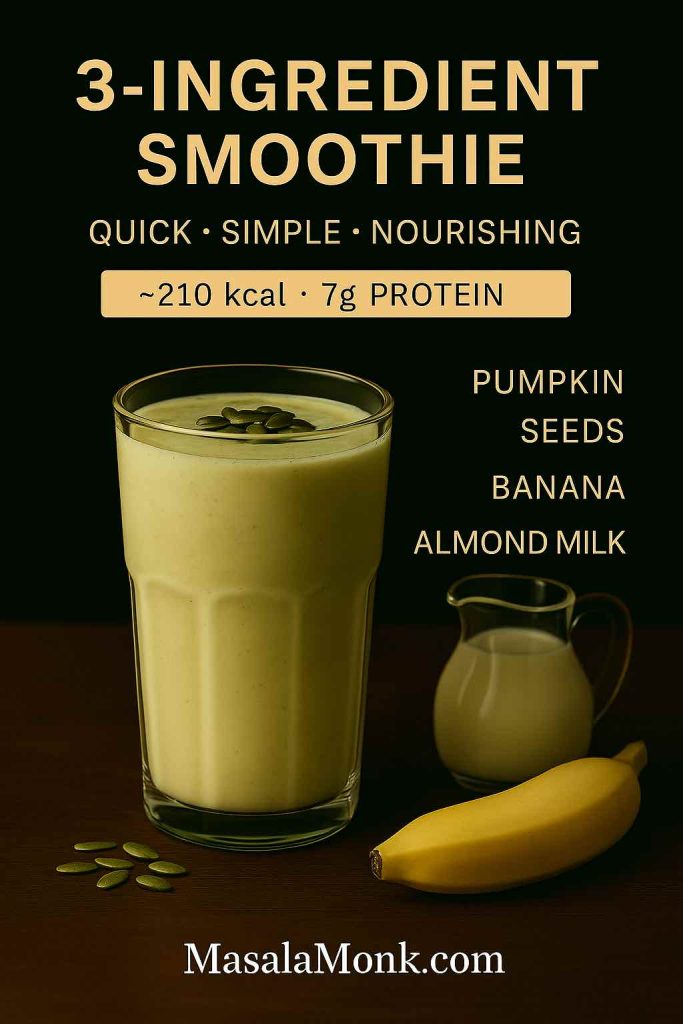
Instructions:
- Toss all ingredients into your blender.
- Blend until smooth and creamy.
- Pour, sip, and enjoy — ready in under 2 minutes.
Nutrition (approx.):
210 kcal | 7g protein | 4g fiber | Simple, quick, satisfying
Pro Tips:
- Out of banana? Use ½ cup frozen mango for a tangier flavor.
- Add 1 tsp honey or dates if you like it sweeter.
- For extra creaminess, toss in 1 tbsp peanut or almond butter.
👉 When you want simple but nourishing, these 10 Creative Chia Pudding Recipes for Every Taste prove that less can indeed be more.
FAQs About Pumpkin Seed Smoothies
Here are the most common questions people ask about pumpkin seeds in smoothies. Each one is answered with practical tips, so you know exactly how to make the most of this nutrient-dense ingredient.
1. Can you put pumpkin seeds in a smoothie?
Yes, absolutely! Pumpkin seeds blend well and add creaminess, protein, and healthy fats. For a smoother texture, soak them overnight before blending.
2. Should I soak pumpkin seeds before making a smoothie?
Soaking is optional but recommended. It softens the seeds, makes blending easier, and can improve digestibility by reducing natural compounds called phytates.
3. How many pumpkin seeds should I add to a smoothie?
A good serving is 2–3 tablespoons. This provides about 7–9 grams of protein, healthy fats, and key minerals like magnesium and zinc — without making the smoothie too calorie-heavy.
4. Are pumpkin seed smoothies good for weight loss?
Yes! The protein and fiber in pumpkin seeds help you feel full longer, which curbs cravings. They also contain healthy fats that support metabolism and balanced blood sugar — both important for weight management.
5. What can I mix with pumpkin seeds in a smoothie?
Pumpkin seeds pair well with bananas, spinach, cucumber, pumpkin purée, avocado, oats, protein powder, and even cocoa. For flavor, try cinnamon, nutmeg, or vanilla.
6. Can I use pumpkin seed butter instead of whole seeds?
Definitely. Pumpkin seed butter gives a creamier texture and blends instantly. Just keep in mind it’s more calorie-dense, so use about 1–2 tablespoons per smoothie.
7. Are pumpkin seed smoothies keto-friendly?
They can be. Skip high-sugar fruits like bananas and use avocado, spinach, almond milk, and a low-carb sweetener instead. Our Low-Carb Pumpkin Seed Shake is a perfect example.
8. Do pumpkin seeds make smoothies taste bitter?
Not if balanced well. Raw seeds can have a slightly earthy flavor, but blending them with fruit, spices, or cocoa masks bitterness. Toasted seeds add a nuttier, richer taste.
9. When is the best time to drink a pumpkin seed smoothie?
- Morning: for steady energy and satiety.
- Post-workout: for muscle recovery (add protein powder).
- Evening snack: to curb cravings with healthy fats and tryptophan (which supports better sleep).
10. Can I drink a pumpkin seed smoothie every day?
Yes! A daily smoothie with 2–3 tablespoons of pumpkin seeds is safe and healthy for most people. Just be mindful of overall calories, especially if your goal is weight loss.
11. Do pumpkin seeds help with digestion?
Yes. They’re high in dietary fiber, which supports gut health and regularity. Pairing them with leafy greens or cucumber in smoothies boosts this effect.
12. Can I use store-bought roasted pumpkin seeds?
Yes, but choose unsalted and unflavored ones. Salted or spiced seeds may alter the taste and nutrition. For the best texture, use raw or soaked seeds.
Final Thoughts
Pumpkin seeds may be small, but when you blend them into a smoothie, they deliver big benefits. From protein and fiber to healthy fats and essential minerals, each sip works to keep you full, energized, and balanced.
What makes them even better is their versatility. With recipes that cover detox mornings, cozy pumpkin spice cravings, low-carb lifestyles, post-workout recovery, and even quick grab-and-go blends, there’s a smoothie for every mood and goal.
At the end of the day, a pumpkin seed smoothie isn’t just about nutrition — it’s about building a simple ritual of self-care. One glass can set the tone for your day, help you stay on track with your goals, and remind you that healthy choices can be both delicious and satisfying.
So grab your blender, try one of these recipes, and see how a handful of pumpkin seeds can transform your smoothie — and maybe even your routine. Cheers to better health, one sip at a time 🥤✨

